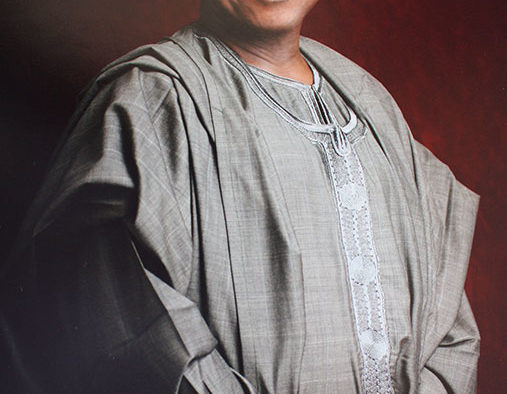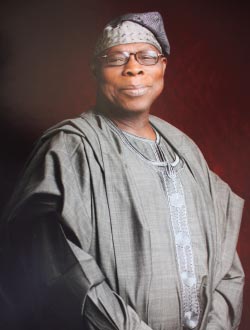On Managing Africa’s Giant

 GB breaks bread with the former leader of Africa’s largest country
GB breaks bread with the former leader of Africa’s largest country
GB: What do you see as the major policy challenges facing Nigeria over the next 10 or 15 years?
OO: They will not be much different from what the challenges have been for Nigeria in the past – the unity of the country, the overall stability of the country, and the security of the country. The health of the economy, as always, will be critical to managing all of these challenges. We also want to see a continued deepening and widening of democracy in Nigeria – in cultural and institutional terms. The goal, over the next decade, is to progress politically to the point where everyone in the country will truly feel that he or she is a Nigerian, and that his or her interests can be taken care of, to his or her satisfaction, within the borders of Nigeria. These are challenges that the government and Nigerian society can definitely meet.
GB: What are the key interests of Nigeria today and tomorrow?
OO: First of all, Nigeria must be united across its territory. Second, Nigeria has obvious economic and social interests. How can Nigeria ensure that every Nigerian is adequately provided for – in terms of education, health and employment? We want Nigerian businesses that produce locally to get the right price for their products within Africa and also in the world. Then, of course, in the international arena, we want Nigeria to occupy an appropriate place in the global division of economic labour – in our West African sub-region, in Africa more generally, and in the world at large.
We are quite recently united after a civil war. At some point, some people in some regions will feel that they want more out of the national cake. That will not unduly worry me.
GB: How unified is Nigeria, as a federation, today?
OO: I would say that we are substantially unified, although there are evidently several hotspots in different parts of the country. Of course, there is no country – particularly no big, highly complex country – that can talk of absolute unity across its territory. Is the UK unified today? National unity in Nigeria has to be massaged and managed constantly. Nigeria’s unity must not be taken for granted through passivity, nor should different regions and groups of Nigerians be manipulated against each other – potentially at great expense to national unity. We are, of course, quite recently united after a civil war. At some point, some people in some regions will feel that they want more out of the national cake. That will not unduly worry me. It is what we are asking for. Instead, what would worry me is if Nigerians said that no matter how big or small the total cake is, they simply do not want the cake at all. Yes, that would worry me. So let me repeat that we are united, although there are people who feel that they give out more than others, and people who want more out of the national cake. These people feel that if they agitate or struggle for this, then there should be mechanisms through which their agitation can be attended to. And my view is that if they have been adequately treated, then their agitation should be laid to rest.
But the fact that we have been virtually one country since independence – for almost 60 years – is a huge success. We should not underplay that. We went through a civil war. I remember when people said at the time that Nigeria would not last much longer. And when I became president in 1999, some people – both Nigerians and non-Nigerians – said that I would be the last president of Nigeria. Not only did I complete my two terms of eight years, but there have been three presidents elected after me. That is significant. Between 1999 and today, we have had the longest period of democratic transition, and democratization more generally, since independence. Again, these are significant things. We were almost bankrupt. We paid our debt, and eventually we cleared our debt. We have not done too badly on that front. Our wish now is for Nigeria to maintain a high standard of accountability and a certain stability and potency in managing its economic affairs. Of course, we hope that we are learning from our past mistakes and not repeating them.
GB: How are relations between Muslims and Christians in Nigeria today?
OO: That has not really been a great problem of late. The issue is mainly economic – not social or religious. When economic troubles arise, these dynamics are linked and confused, but it is the economics that is the driver. People are, in economic terms, always looking for hope. Who is taking more? Who is taking what you have? Take, for instance, the issue of nomadic cattle rearers or herders (Fulanis) and crop farmers in many parts of Nigeria. This is a purely economic issue. Most of the country is Muslim, while most of the native crop farmers are Christian. So when the nomadic cattle move across the farmlands of so-called native crop farmers and there is destruction of their crop farm, then this is evidently an economic event. Then, all of a sudden, the crop farmer becomes essentially Christian and the cattle herder essentially Muslim – that is, the two are now in conflict and compete. Actually, the underlying factor is economic, and perhaps social also. I would not say that these conflicts are universal in Nigeria, but there are certainly conflicts, and there is dissatisfaction, in economic and social terms. Governments, for their part, can help to solve these issues, but they can also exacerbate them if the underlying problems are misdiagnosed, improperly treated or altogether ignored.
GB: What is the current situation with Boko Haram?
OO: The national government is now running the military, instead of the other way around. That is a crucial achievement for Nigerian democracy. The handling of the question of national security in respect of Boko Haram is certainly better under the present government than under the administration before it. What is the genesis of Boko Haram? We can see that in the northeast of the country, there is clearly a lack of adequate development compared with other parts of the country. In the southwest and southeast, the level of education (primary, secondary or post-secondary) is almost 90 percent. In the northeast, where Boko Haram is rooted, it is less than 50 percent. Obviously, that is not good. This is not good for the unity of the country or for national stability and security. So when the present administration is able to finally put down Boko Haram, it will have to face the social and economic development of the region head-on. That cannot be swept under the carpet.
GB: How significant has the hit to the national budget or national economy been from the drop in oil prices over the last couple of years?
OO: Of course, it has affected us badly. The low price of oil and the low price of other commodities – especially given drops in demand for commodities from China and India – have affected not only Nigeria, but indeed Africa as a whole. Some 10 years ago, we planned, established and built up a very handsome reserve as the price of oil was going up. We maintained that reserve from about 2008 until about three years ago, as the price started going down. We built up the reserve such that when a rainy day would come, we would be comfortable.
GB: What are the strategic or economic prospects for the West African region over the next 10 to 15 years?
OO: I would expect that West Africa will become more successful and more dynamic in economic terms – particularly if we succeed in regional economic integration, including having a common currency, having stability in the various national economies, and having a harmonized fiscal policy. I really do see a West African common currency. I see more integration. Goods produced in one part of West Africa should be consumed easily and seamlessly in other parts of the region. More integration generally will lead to more regional harmony and better security and stability.
GB: Does Nigeria enjoy good relations with all West African countries?
OO: Nigeria is mindful of each of its neighbours. I believe that we have very good relationships with all West African countries. Most of our brothers and sisters in West Africa – not all of them – have trusted Nigeria as the leader of West Africa. I think that is clearly a good thing. We are a brother to all in a massive region, and we have played a significant leadership role in maintaining security and stability. We have helped other countries when they have been in need.
More generally, Nigeria has made significant inroads in international affairs since independence. I myself was part of the first contingent force – a UN peacekeeping force – sent to the Democratic Republic of Congo. (I continue my work for peace in the DRC to this day.) So we have played a very significant role in Central Africa, but also, naturally, in West Africa (our own region) and indeed in Africa generally.
GB: What is Nigeria’s most important bilateral relationship in West Africa?
OO: I believe that all of the countries in West Africa are important for Nigeria. I personally have never regarded any country in Africa as unimportant. We Nigerians have committed ourselves to a very important role in maintaining security throughout West Africa. We did it in Liberia, we did it in Sierra Leone, we did it in Mali, and also in Guinea-Bissau. We have been the peacekeeper – as it were – of West Africa, in spite of our own needs.
We still have longstanding presidents in several countries, but these are the exceptions rather than the rule. We have few interstate conflicts, but still have intrastate conflicts, which are caused principally by inadequate attention paid to socioeconomic development.
GB: How do you see the future of the African continent, from the Nigerian perspective, over the next 10 or 15 years?
OO: The continent of Africa is generally strong. When the financial and economic crisis broke in America in 2007-2008, Africa held up generally well. Even now, we are holding up well – Nigeria included, for the reasons already mentioned. The economic reality in Africa will continue to improve. Politically, too, we have great capabilities and great potential. Democracy – or at least significant tendencies to democratization – is a reality in much of Africa. We still have longstanding presidents in several countries, but these are the exceptions rather than the rule. These exceptions are in the single digits. We have few interstate conflicts – take, for example, the conflict between Ethiopia and Eritrea – but still have intrastate conflicts, which are caused principally by inadequate attention paid to socioeconomic development.
I see a bright future for Africa. There is a lot that we have to do to ensure security, stability, cooperation, cohesion and unity in each of our countries. These goals are achievable. We need the rest of the world to give Africa the attention that Africa needs and deserves. This applies to the international economic division of labour, strategic and political decision-making, and, of course, the division of resources. In all of these, we need to ensure that Africa is given adequate attention.
GB: How is the African Union doing in terms of its performance on the continent?
OO: The African Union is there to stay. Of course, as with many big organizations – and international organizations in particular – things can be better. The next stage of African Union activities should prioritize economic integration – continentally and, short of that, regionally. There is also the growing issue of the new great tides of migration through and out of Africa, fuelled by instability in the Middle East, North Africa and other parts of Africa. Young Africans are naturally looking for economic opportunity and jobs outside Africa – in Europe and elsewhere. Economics, as I mentioned, dictates a great deal, and these young Africans believe – rightly or wrongly – that they can strike it rich in other parts of the world. Progress in Africa has certainly been slower than one would have wished, but there is almost no disagreement or confusion about the end goals or how they are to be attained.
![]()
Olusegun Obasanjo was President of Nigeria between 1999 and 2007.











